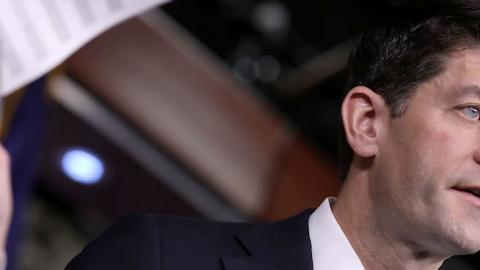The GOP is hoping to get a lot of bang for its buck on infrastructure. House Speaker Paul Ryan announced on Thursday that he will target $40 in private investment for every $1 his caucus approves in infrastructure spending. The Hill reports:
“That's not a trillion dollars coming from federal taxpayers into the transportation system,” Ryan said. “That is the total amount we're shooting for.”
But tax credits would still need to be fully paid for, Ryan said. Trump claims his plan would be revenue neutral thanks to taxes from new jobs and contractor profits, but economists have cast doubt on those assertions.
And any direct spending in the plan, which would be around $3.5 billion under Ryan’s vision, would definitely need an offset to pass the Republican-led Congress.
“Now we have to go about figuring out how to, in a fiscally responsible way, get that going,” Ryan said. “We have to cut spending elsewhere to pay for infrastructure.”
It's unclear where Ryan got the 40-1 ratio, but it certainly seems rather idealistic to us. The United States has very little experience with privatization of infrastructure compared to other developed countries, and it's going to be hard for the current institutions to unlock so much value.
It's not impossible, of course. There are plenty of profitable infrastructure assets in the U.S. that could be handed over to private interests. With time and care, it's quite possible to structure and approve thousands of concessions that would amount to $1 trillion of new investment in total. But it won't be easy, and there's a lot of persuading still left to be done: most Americans don't like the idea yet.
A parting thought: when Andrew Jackson took office, he eliminated much of the bureaucracy and turned the civil service into a spoils system. We wouldn't be surprised if Trump, who sees himself as an heir to Jackson, takes a similar approach with infrastructure (or, if his rumored budget is a guide, to government in general). Whether intentionally or not, Ryan's plan would lend itself to a Jacksonian reform of, among other things, the Department of Transportation. There's no need for a large bureaucracy if government's job becomes to hand out money to private firms contracted to perform vital tasks.




















